Thomas James Richards, Diaries, Transcript Vol. 2 - Part 4
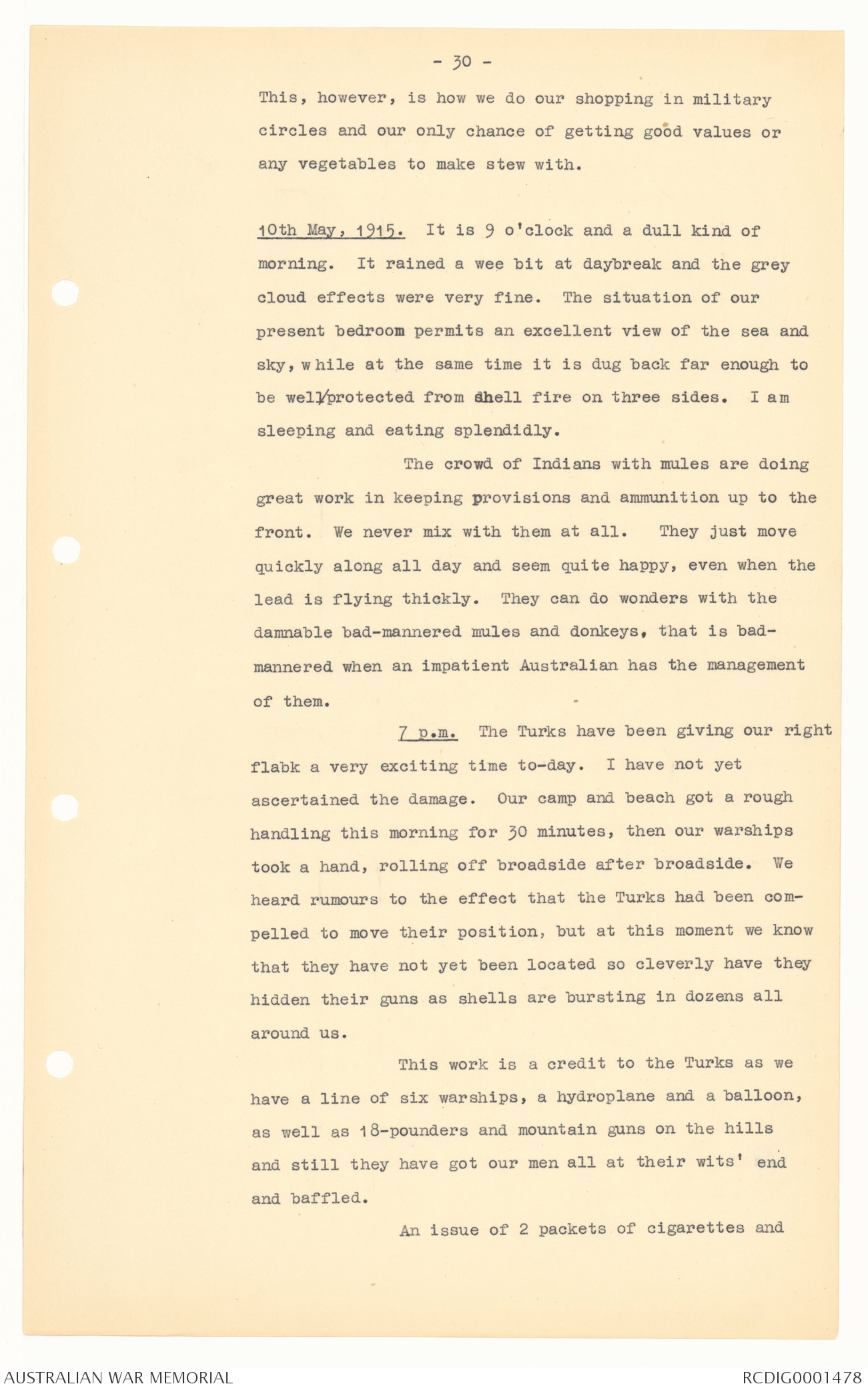
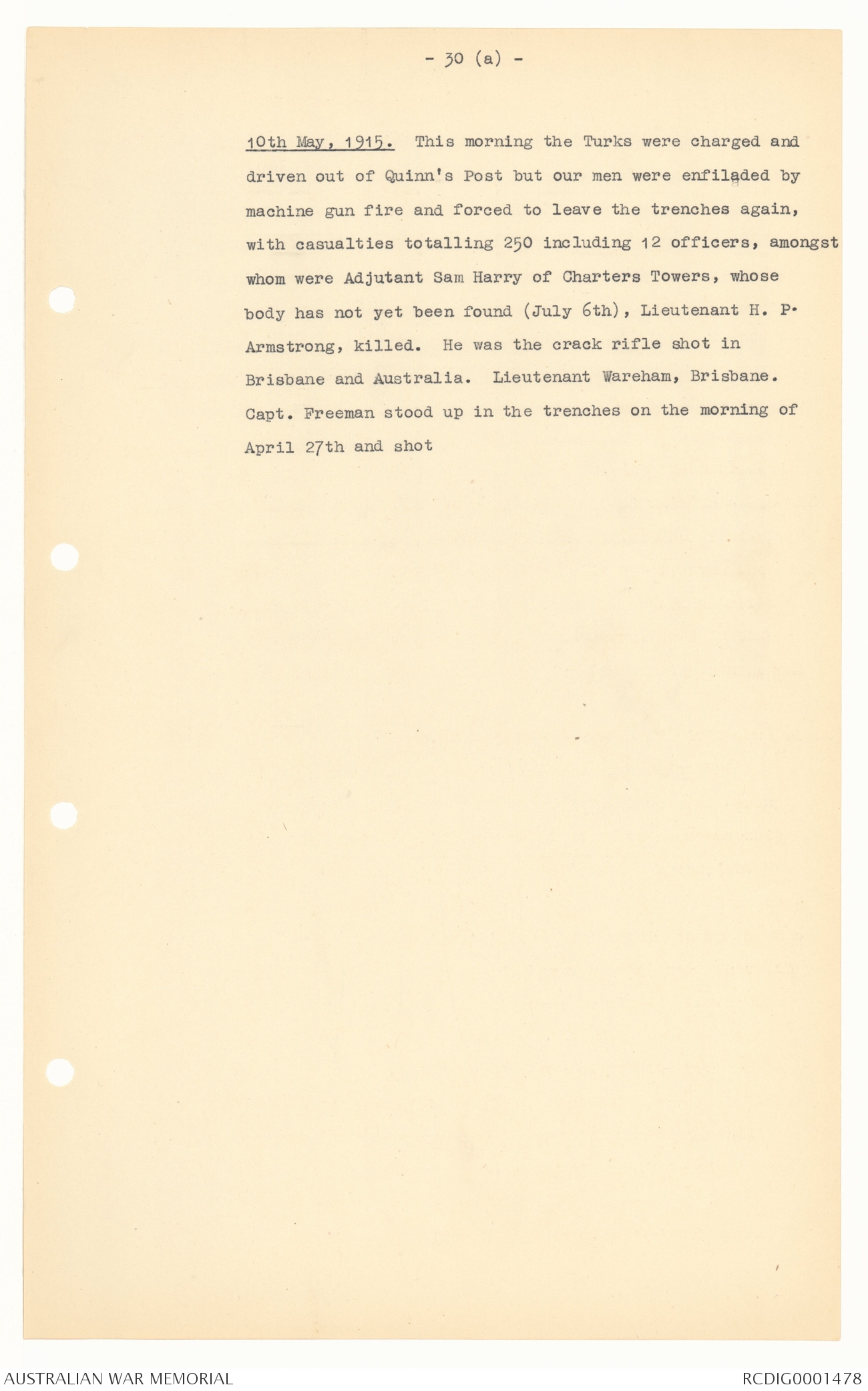
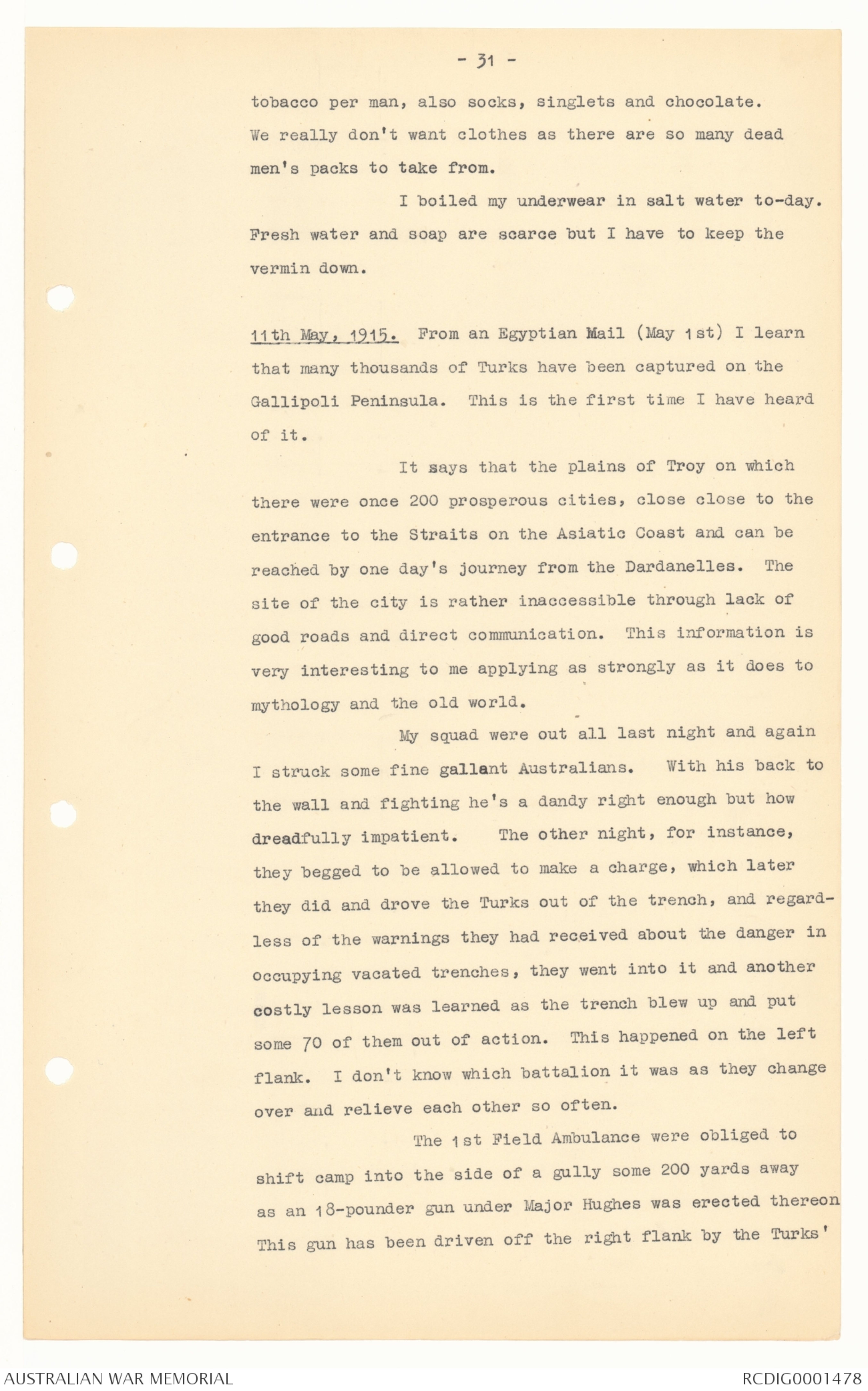
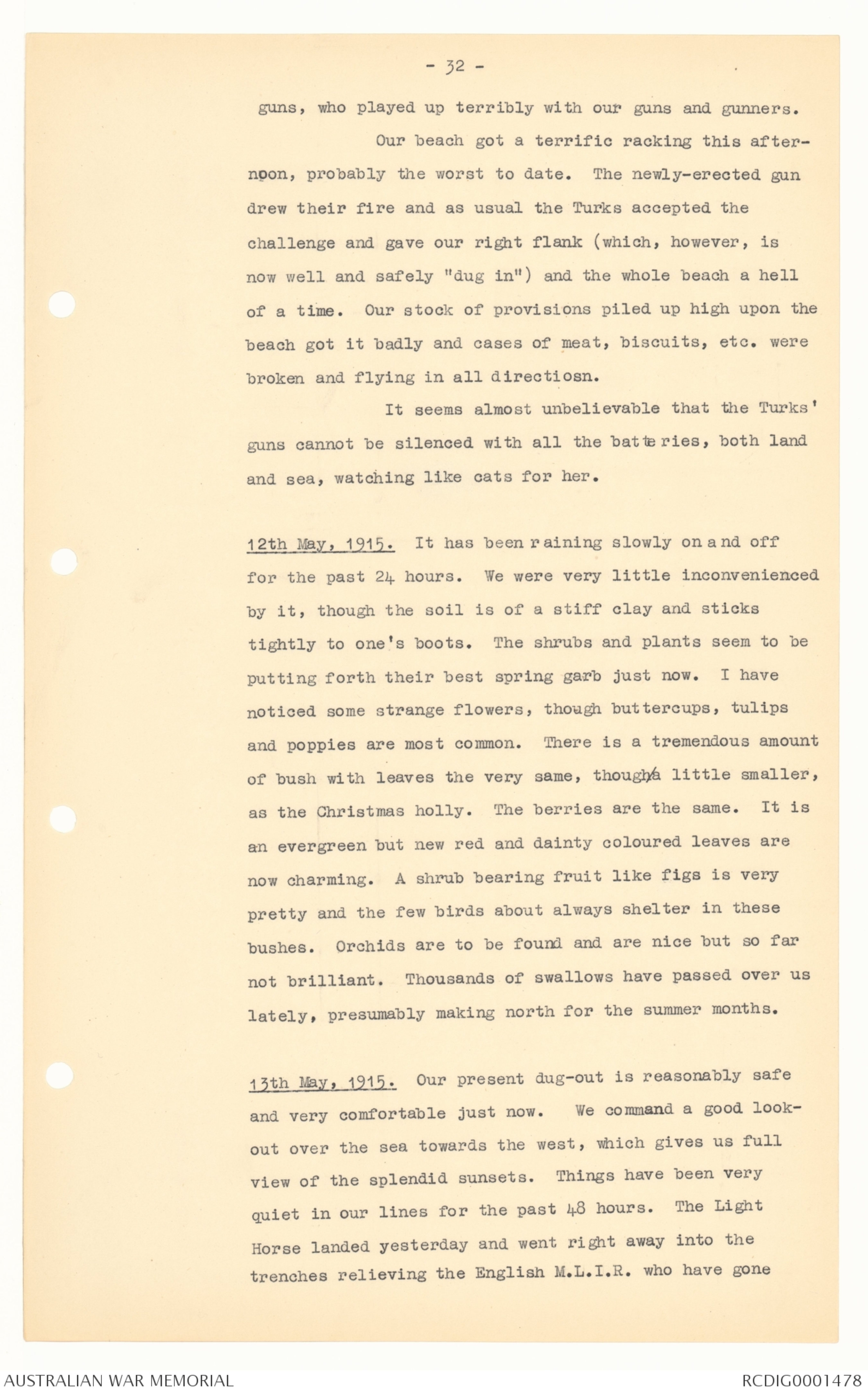
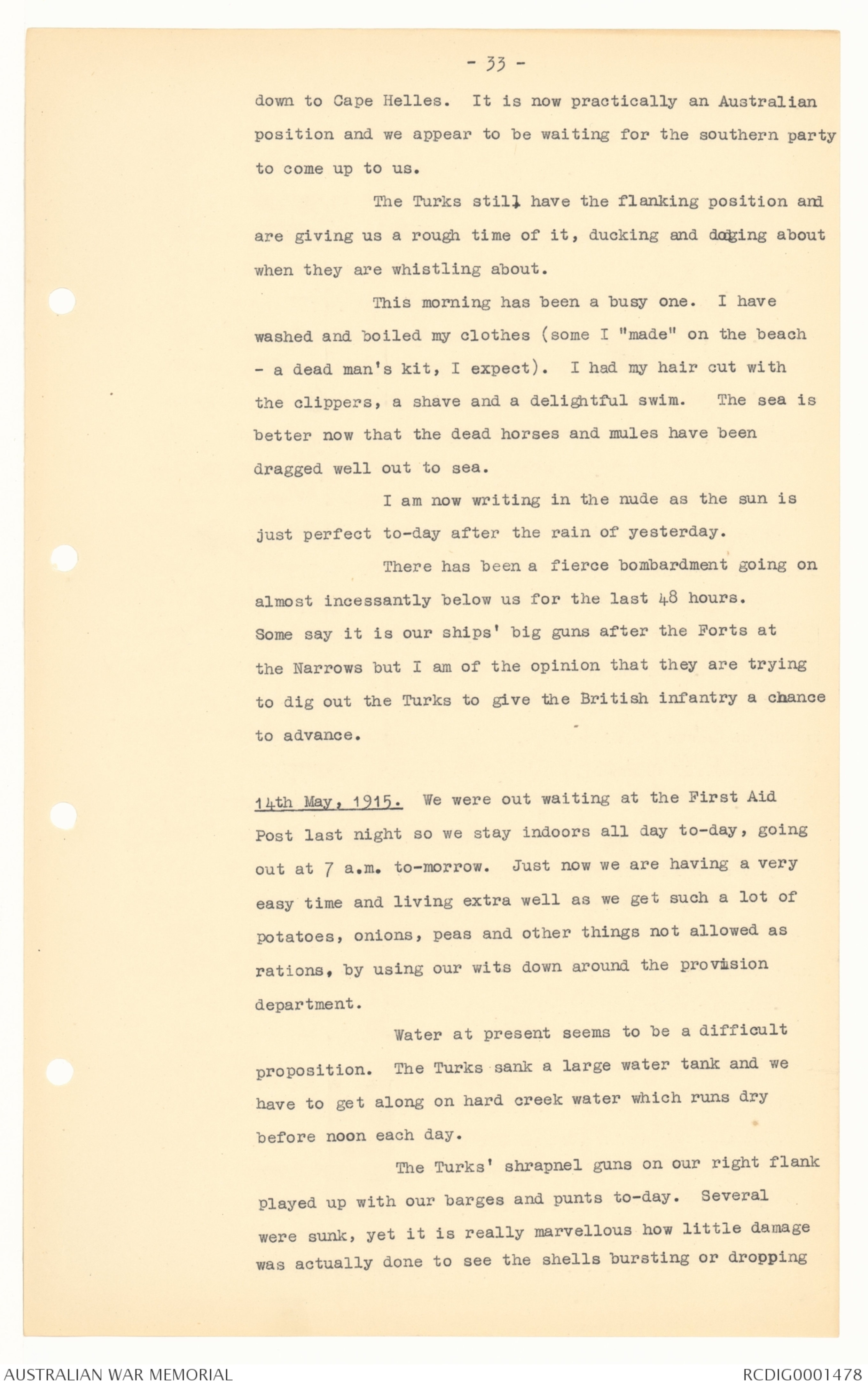
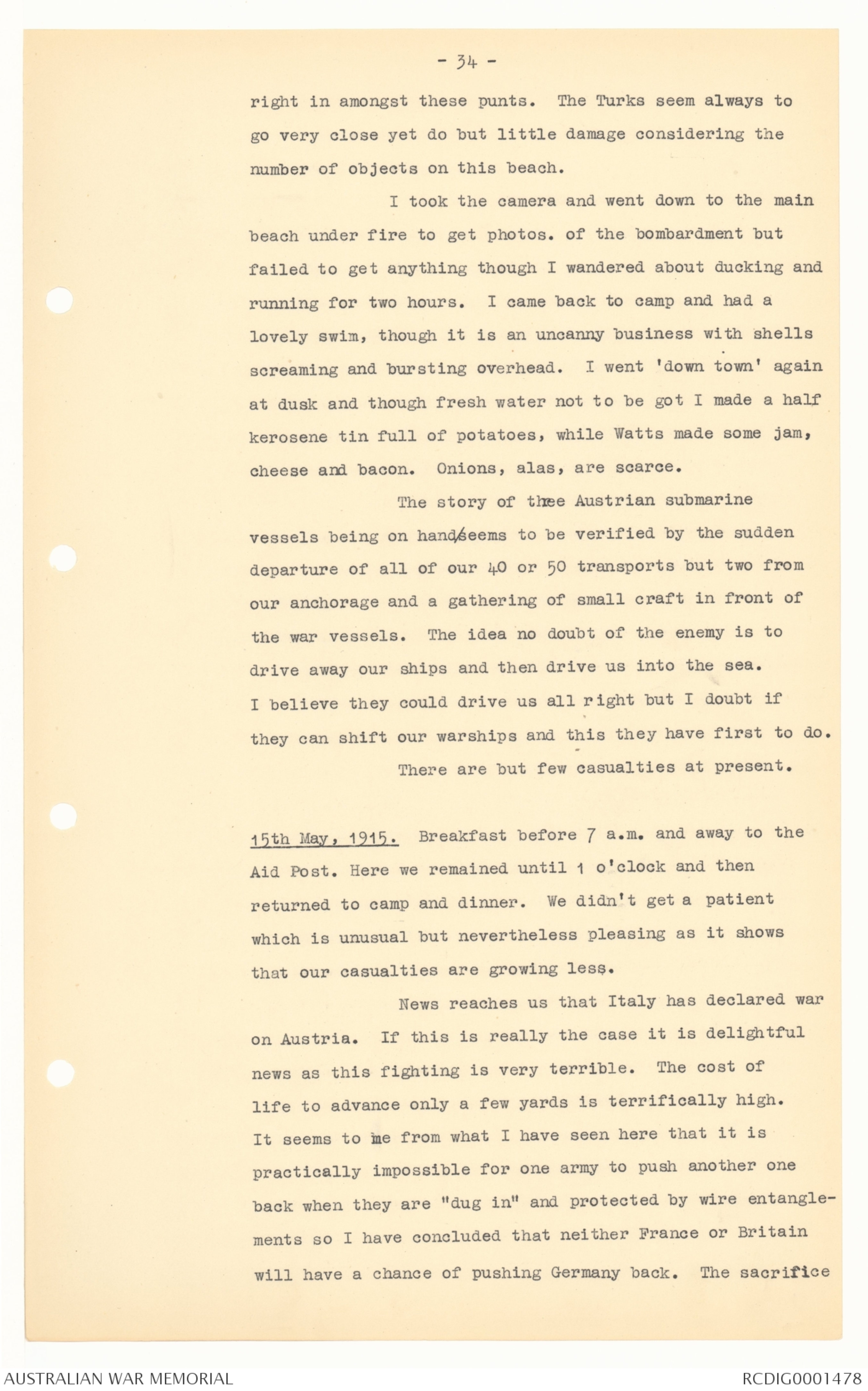
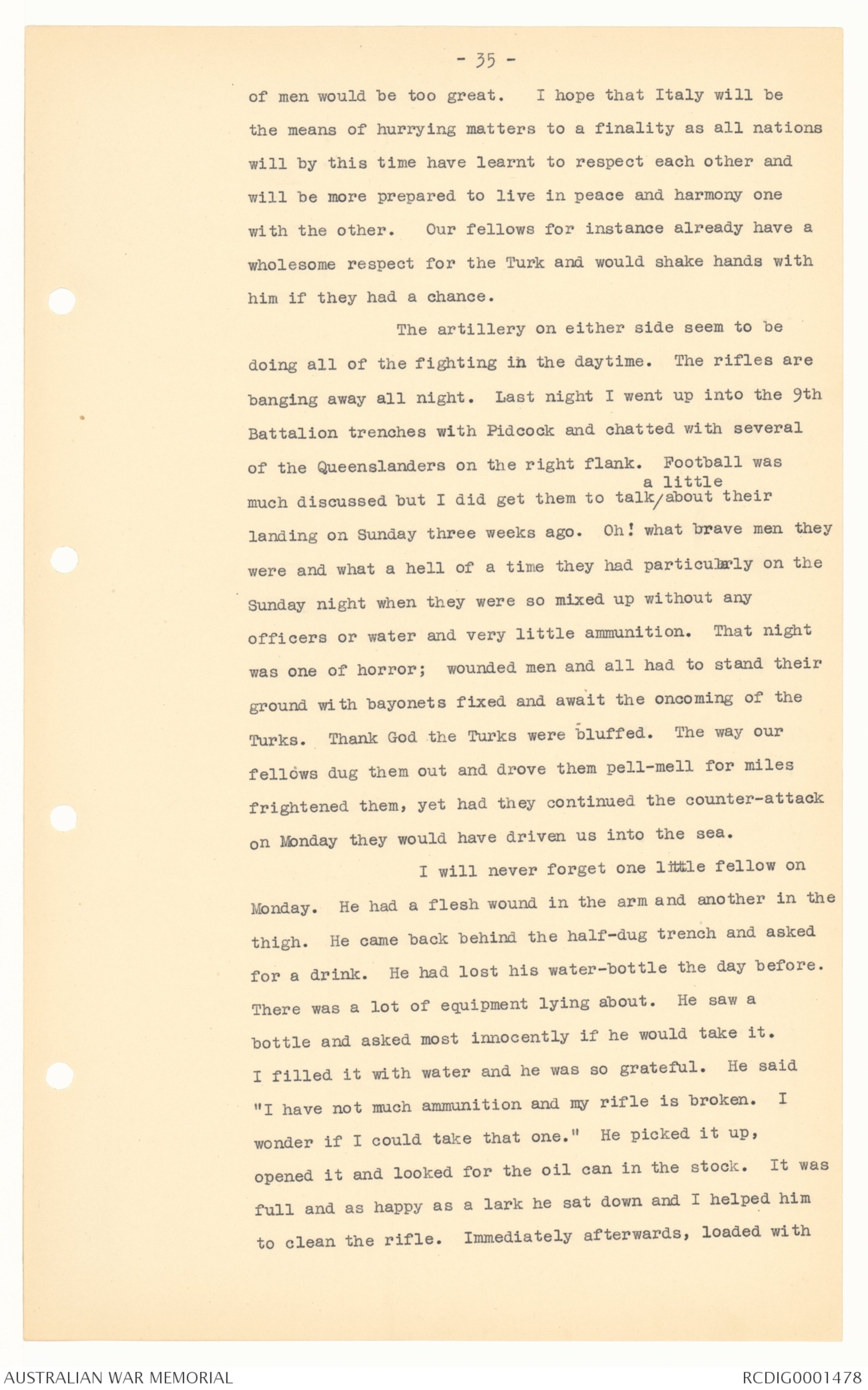
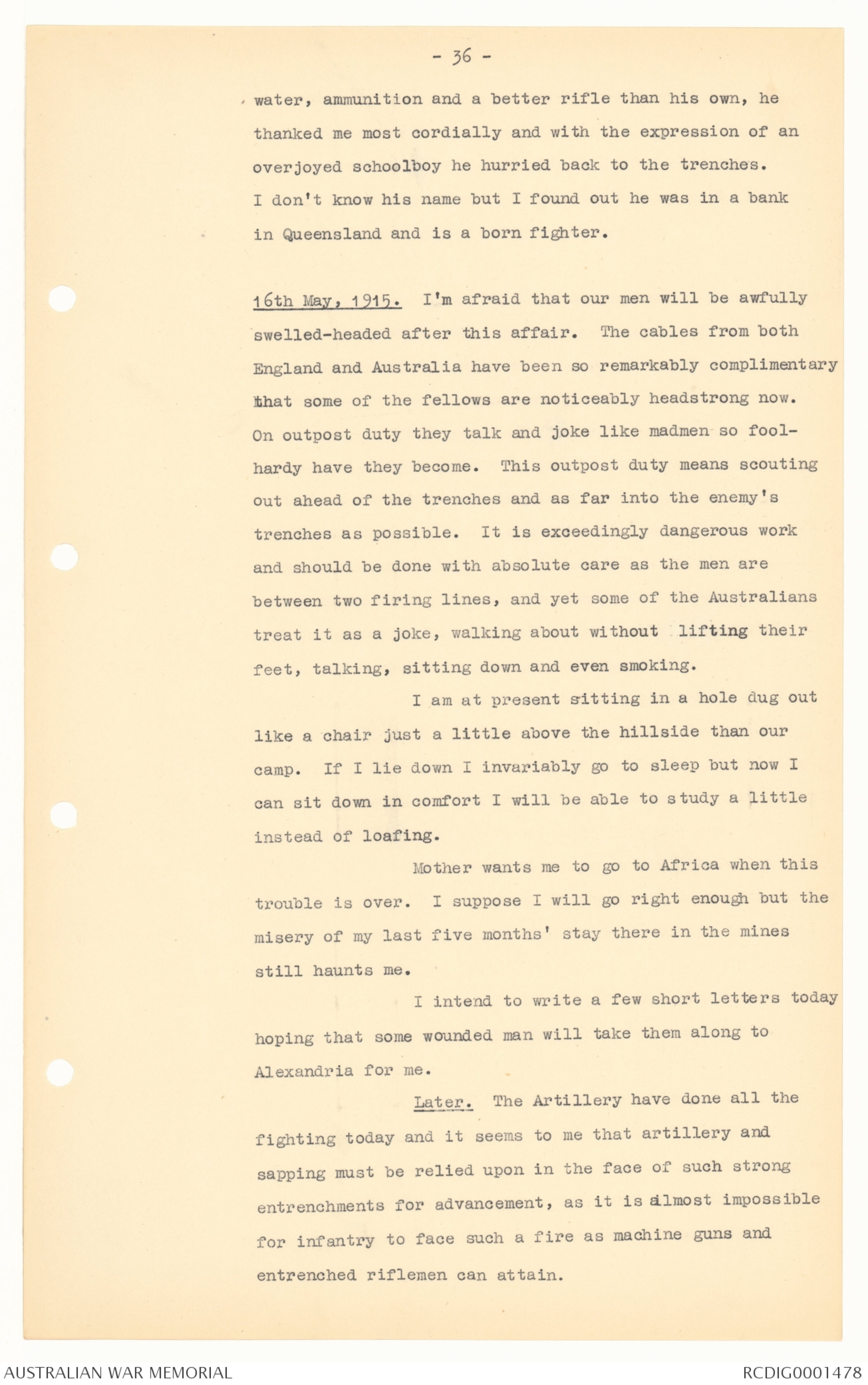
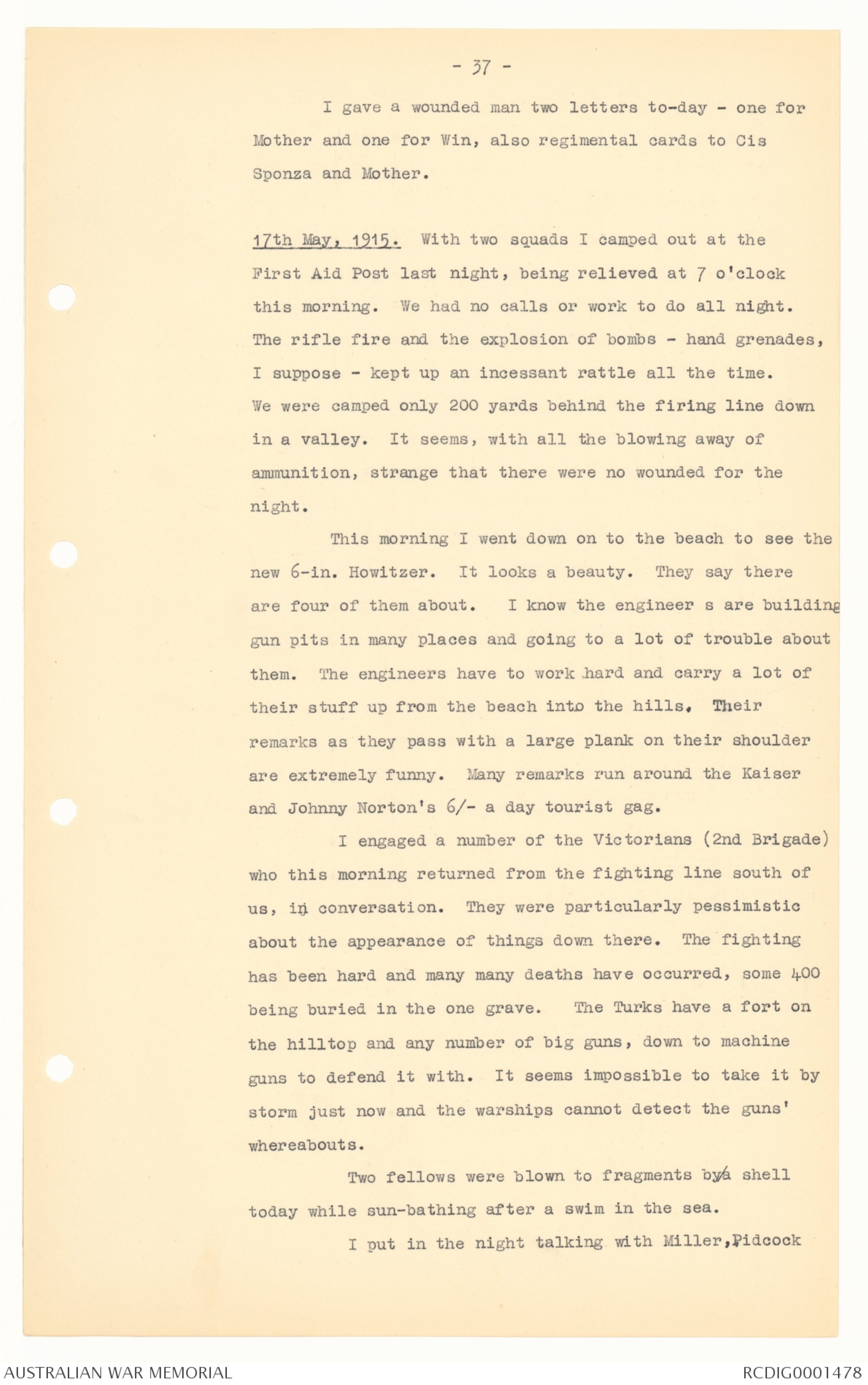
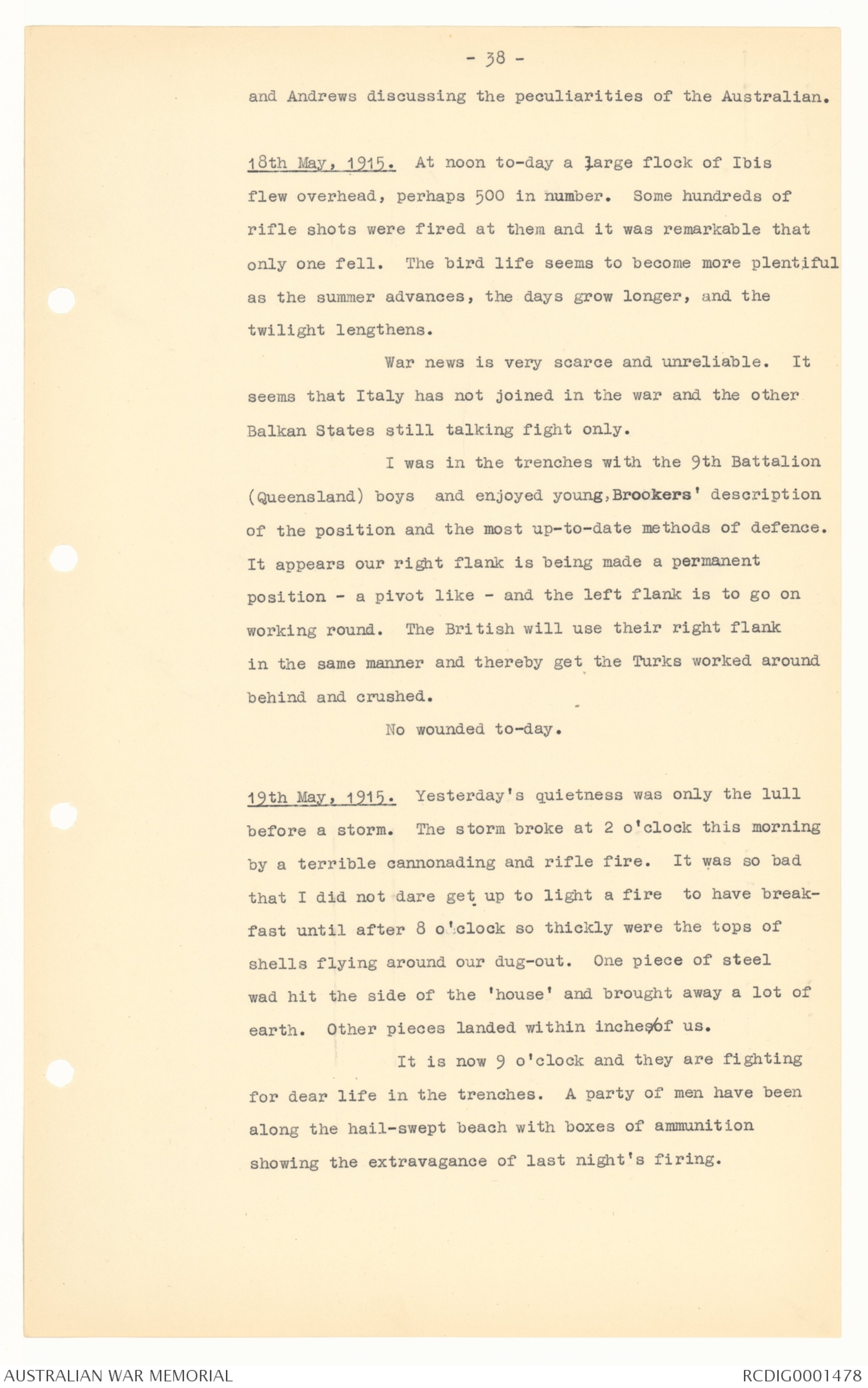
-30 -
This, however, is how we do our shopping in military
circles and our only chance of getting good values or
any vegetables to make stew with.
10th May, 1915. It is 9 o'clock and a dull kind of
morning. It rained a wee bit at daybreak and the grey
cloud effects were very fine. The situation of our
present bedroom permits an excellent view of the sea and
sky, while at the same time it is dug back far enough to
be well/protected from shell fire on three sides. I am
sleeping and eating splendidly.
The crowd of Indians with mules are doing
great work in keeping provisions and ammunition up to the
front. We never mix with them at all. They just move
quickly along all day and seem quite happy, even when the
lead is flying thickly. They can do wonders with the
damnable bad-mannered mules and donkeys, that is bad-mannered
when an impatient Australian has the management
of them.
7 p.m. The Turks have been giving our right
flabk a very exciting time to-day. I have not yet
ascertained the damage. Our camp and beach got a rough
handling this morning for 30 minutes, then our warships
took a hand, rolling off broadside after broadside. We
heard rumours to the effect that the Turks had been compelled
to move their position, but at this moment we know
that they have not yet been located so cleverly have they
hidden their guns as shells are bursting in dozens all
around us.
This work is a credit to the Turks as we
have a line of six warships, a hydroplane and a balloon,
as well as 18-pounders and mountain guns on the hills
and still they have got our men all at their wits' end
and baffled.
An issue of 2 packets of cigarettes and
-30 (a)-
10th May, 1915. This morning the Turks were charged and
driven out of Quinn's Post but our men were enfiladed by
machine gun fire and forced to leave the trenches again,
with casualties totalling 250 including 12 officers, amongst
whom were Adjutant Sam Harry of Charters Towers, whose
body has not yet been found (July 6th), Lieutenant H. P.
Armstrong, killed. He was the crack rifle shot in
Brisbane and Australia. Lieutenant Wareham, Brisbane.
Capt. Freeman stood up in the trenches on the morning of
April 27th and shot
- 31-
tobacco per man, also socks, singlets and chocolate.
We really don’t want clothes as there are so many dead
men's packs to take from.
I boiled my underwear in salt water to-day.
Fresh water and soap are scarce but I have to keep the
vermin down.
11th May, 1915. From an Egyptian Mail (May 1st) I learn
that many thousands of Turks have been captured on the
Gallipoli Peninsula. This is the first time I have heard
of it.
It says that the plains of Troy on which
there were once 200 prosperous cities, close close to the
entrance to the Straits on the Asiatic Coast and can be
reached by one day's journey from the Dardanelles. The
site of the city is rather inaccessible through lack of
good roads and direct communication. This information is
very interesting to me applying as strongly as it does to
mythology and the old world.
My squad were out all last night and again
I struck some fine gallant Australians. With his back to
the wall and fighting he's a dandy right enough but how
dreadfully impatient. The other night, for instance,
they begged to be allowed to make a charge, which later
they did and drove the Turks out of the trench, and regardless
of the warnings they had received about the danger in
occupying vacated trenches, they went into it and another
costly lesson was learned as the trench blew up and put
some 70 of them out of action. This happened on the left
flank. I don’t know which battalion it was as they change
over and relieve each other so often.
The 1st Field Ambulance were obliged to
shift camp into the side of a gully some 200 yards away
as an 18-pounder gun under Major Hughes was erected thereon
This gun has been driven off the right flank by the Turks'
-32-
guns, who played up terribly with our guns and gunners.
Our beach got a terrific racking this afternoon,
probably the worst to date. The newly-erected gun
drew their fire and as usual the Turks accepted the
challenge and gave our right flank (which, however, is
now well and safely "dug in") and the whole beach a hell
of a time. Our stock of provisions piled up high upon the
beach got it badly and cases of meat, biscuits, etc. were
broken and flying in all directiosn.
It seems almost unbelievable that the Turks'
guns cannot be silenced with all the batteries, both land
and sea, watching like cats for her.
12th May, 1915. It has been raining slowly on and off
for the past 24 hours. We were very little inconvenienced
by it, though the soil is of a stiff clay and sticks
tightly to one's boots. The shrubs and plants seem to be
putting forth their best spring garb just now. I have
noticed some strange flowers, though buttercups, tulips
and poppies are most common. There is a tremendous amount
of bush with leaves the very same, though/a little smaller,
as the Christmas holly. The berries are the same. It is
an evergreen but new red and dainty coloured leaves are
now charming. A shrub bearing fruit like figs is very
pretty and the few birds about always shelter in these
bushes. Orchids are to be found and are nice but so far
not brilliant. Thousands of swallows have passed over us
lately, presumably making north for the summer months.
13th May, 1915. Our present dug-out is reasonably safe
and very comfortable just now. We command a good lookout
over the sea towards the west, which gives us full
view of the splendid sunsets. Things have been very
quiet in our lines for the past 48 hours. The Light
Horse landed yesterday and went right away into the
trenches relieving the English M.L.I.R. who have gone
-33-
down to Cape Helles. It is now practically an Australian
position and we appear to be waiting for the southern party
to come up to us.
The Turks still have the flanking position and
are giving us a rough time of it, ducking and dodging about
when they are whistling about.
This morning has been a busy one. I have
washed and boiled my clothes (some I "made" on the beach
a dead man's kit, I expect). I had my hair cut with
the clippers, a shave and a delightful swim. The sea is
better now that the dead horses and mules have been
dragged well out to sea.
I am now writing in the nude as the sun is
just perfect to-day after the rain of yesterday.
There has been a fierce bombardment going on
almost incessantly below us for the last 48 hours.
Some say it is our ships' big guns after the Forts at
the Narrows but I am of the opinion that they are trying
to dig out the Turks to give the British infantry a chance
to advance.
14th May, 1915. We were out waiting at the First Aid
Post last night so we stay indoors all day to-day, going
out at 7 a.m. to-morrow. Just now we are having a very
easy time and living extra well as we get such a lot of
potatoes, onions, peas and other things not allowed as
rations, by using our wits down around the provision
department.
Water at present seems to be a difficult
proposition. The Turks sank a large water tank and we
have to get along on hard creek water which runs dry
before noon each day.
The Turks' shrapnel guns on our right flank
played up with our barges and punts to-day. Several
were sunk, yet it is really marvellous how little damage
was actually done to see the shells bursting or dropping
-34 -
right in amongst these punts. The Turks seem always to
go very close yet do but little damage considering the
number of objects on this beach.
I took the camera and went down to the main
beach under fire to get photos. of the bombardment but
failed to get anything though I wandered about ducking and
running for two hours. I came back to camp and had a
lovely swim, though it is an uncanny business with shells
screaming and bursting overhead. I went 'down town' again
at dusk and though fresh water not to be got I made a half
kerosene tin full of potatoes, while Watts made some jam,
cheese and bacon. Onions, alas, are scarce.
The story of three Austrian submarine
vessels being on hand/seems to be verified by the sudden
departure of all of our 40 or 50 transports but two from
our anchorage and a gathering of small craft in front of
the war vessels. The idea no doubt of the enemy is to
drive away our ships and then drive us into the sea.
I believe they could drive us all right but I doubt if
they can shift our warships and this they have first to do.
There are but few casualties at present.
15th May, 1915. Breakfast before 7 a.m. and away to the
Aid Post. Here we remained until 1 o'clock and then
returned to camp and dinner. We didn't get a patient
which is unusual but nevertheless pleasing as it shows
that our casualties are growing less.
News reaches us that Italy has declared war
on Austria. If this is really the case it is delightful
news as this fighting is very terrible. The cost of
life to advance only a few yards is terrifically high.
It seems to me from what I have seen here that it is
practically impossible for one army to push another one
back when they are "dug in" and protected by wire entanglements
so I have concluded that neither France or Britain
will have a chance of pushing Germany back. The sacrifice
-35-
of men would be too great. I hope that Italy will be
the means of hurrying matters to a finality as all nations
will by this time have learnt to respect each other and
will be more prepared to live in peace and harmony one
with the other. Our fellows for instance already have a
wholesome respect for the Turk and would shake hands with
him if they had a chance.
The artillery on either side seem to be
doing all of the fighting in the daytime. The rifles are
banging away all night. Last night I went up into the 9th
Battalion trenches with Pidcock and chatted with several
of the Queenslanders on the right flank. Football was
much discussed but I did get them to talk/ ^a little about their
landing on Sunday three weeks ago. Oh! what brave men they
were and what a hell of a time they had particularly on the
Sunday night when they were so mixed up without any
officers or water and very little ammunition. That night
was one of horror; wounded men and all had to stand their
ground with bayonets fixed and await the oncoming of the
Turks. Thank God the Turks were bluffed. The way our
fellows dug them out and drove them pell-mell for miles
frightened them, yet had they continued the counter-attack
on Monday they would have driven us into the sea.
I will never forget one little fellow on
Monday. He had a flesh wound in the arm and another in the
thigh. He came back behind the half-dug trench and asked
for a drink. He had lost his water-bottle the day before.
There was a lot of equipment lying about. He saw a
bottle and asked most innocently if he would take it.
I filled it with water and he was so grateful. He said
"I have not much ammunition and my rifle is broken. I
wonder if I could take that one." He picked it up,
opened it and looked for the oil can in the stock. It was
full and as happy as a lark he sat down and I helped him
to clean the rifle. Immediately afterwards, loaded with
-36-
water, ammunition and a better rifle than his own, he
thanked me most cordially and with the expression of an
overjoyed schoolboy he hurried back to the trenches.
I don't know his name but I found out he was in a bank
in Queensland and is a born fighter.
16th May, 1915. I'm afraid that our men will be awfully
swelled-headed after this affair. The cables from both
England and Australia have been so remarkably complimentary
that some of the fellows are noticeably headstrong now.
On outpost duty they talk and joke like madmen so foolhardy
have they become. This outpost duty means scouting
out ahead of the trenches and as far into the enemy's
trenches as possible. It is exceedingly dangerous work
and should be done with absolute care as the men are
between two firing lines, and yet some of the Australians
treat it as a joke, walking about without lifting their
feet, talking, sitting down and even smoking.
I am at present sitting in a hole dug out
like a chair just a little above the hillside than our
camp. If I lie down I invariably go to sleep but now I
can sit down in comfort I will be able to study a little
instead of loafing.
Mother wants me to go to Africa when this
trouble is over. I suppose I will go right enough but the
misery of my last five months' stay there in the mines
still haunts me.
I intend to write a few short letters today
hoping that some wounded man will take them along to
Alexandria for me.
Later. The Artillery have done all the
fighting today and it seems to me that artillery and
sapping must be relied upon in the face of such strong
entrenchments for advancement, as it is almost impossible
for infantry to face such a fire as machine guns and
entrenched riflemen can attain.
-37-
I gave a wounded man two letters to-day - one for
Mother and one for Win, also regimental cards to Cis
Sponza and Mother.
17th May, 1915. With two squads I camped out at the
First Aid Post last night, being relieved at 7 o'clock
this morning. We had no calls or work to do all night.
The rifle fire and the explosion of bombs - hand grenades,
I suppose - kept up an incessant rattle all the time.
We were camped only 200 yards behind the firing line down
in a valley. It seems, with all the blowing away of
ammunition, strange that there were no wounded for the
night.
This morning I went down on to the beach to see the
new 6-in. Howitzer. It looks a beauty. They say there
are four of them about. I know the engineers are building
gun pits in many places and going to a lot of trouble about
them. The engineers have to work hard and carry a lot of
their stuff up from the beach into the hills. Their
remarks as they pass with a large plank on their shoulder
are extremely funny. Many remarks run around the Kaiser
and Johnny Norton's 6/- a day tourist gag.
I engaged a number of the Victorians (2nd Brigade)
who this morning returned from the fighting line south of
us, in conversation. They were particularly pessimistic
about the appearance of things down there. The fighting
has been hard and many many deaths have occurred, some 400
being buried in the one grave. The Turks have a fort on
the hilltop and any number of big guns, down to machine
guns to defend it with. It seems impossible to take it by
storm just now and the warships cannot detect the guns'
whereabouts.
Two fellows were blown to fragments by/a shell
today while sun-bathing after a swim in the sea.
I put in the night talking with Miller, Pidcock
- 38 -
and Andrews discussing the peculiarities of the Australian.
18th May, 1915. At noon to-day a large flock of Ibis
flew overhead, perhaps 500 in number. Some hundreds of
rifle shots were fired at them and it was remarkable that
only one fell. The bird life seems to become more plentiful
as the summer advances, the days grow longer, and the
twilight lengthens.
War news is very scarce and unreliable. It
seems that Italy has not joined in the war and the other
Balkan States still talking fight only.
I was in the trenches with the 9th Battalion
(Queensland) boys, and enjoyed young, Brookers' description
of the position and the most up-to-date methods of defence.
It appears our right flank is being made a permanent
position - a pivot like - and the left flank is to go on
working round. The British will use their right flank
in the same manner and thereby get the Turks worked around
behind and crushed.
No wounded to-day.
19th May, 1915. Yesterday's quietness was only the lull
before a storm. The storm broke at 2 o'clock this morning
by a terrible cannonading and rifle fire. It was so bad
that I did not dare get up to light a fire to have breakfast
until after 8 o'clock so thickly were the tops of
shells flying around our dug-out. One piece of steel
wad hit the side of the 'house' and brought away a lot of
earth. Other pieces landed within inches/of us.
It is now 9 o'clock and they are fighting
for dear life in the trenches. A party of men have been
along the hail-swept beach with boxes of ammunition
showing the extravagance of last night's firing.
 Not Yet Replaced By AI
Not Yet Replaced By AIThis transcription item is now locked to you for editing. To release the lock either Save your changes or Cancel.
This lock will be automatically released after 60 minutes of inactivity.